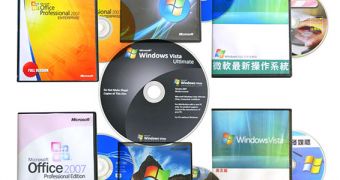Windows XP, released at the end of 2001, went virtually barefoot into the world and was little ready or able to tackle the piracy phenomenon. It was only with the availability of the Windows Genuine Advantage mechanism that Microsoft addressed the pressing issue of pirated copies of XP actively, and furthermore, it did so on the end users' machines. By comparison, Windows Vista has been fitted with an overhauled activation infrastructure, intimately connected with the WGA. Pirated copies of Vista would be identified as such, would lose functionality and move into Reduced Functionality Mode, depriving the user of the full experience of the operating system. The same was not valid for Windows XP, as the items that had been detected as pirated by the WGA suffered only minor disruptions of functionality and usability via the Notifications component of the anti-piracy mechanism, a constant reminder for the users that their operating system was non-genuine.
"While we've made some progress, piracy remains an ongoing problem that faces most industries with strong intellectual property components, and is particularly severe for us, our customers and partners. Software pirates are becoming more sophisticated - not just with their ability to produce high-quality fakes, but in their distribution systems and international reach. Research from the Business Software Alliance (BSA) estimates that annually, 35 percent of software in use worldwide is not paid for, and in certain countries that rate can top 80 percent. We have to address this. We have a responsibility to our shareholders, partners and customers to promote legal use of our products," revealed Mike Sievert, Corporate Vice President, Windows Product Marketing.
Sievert revealed that the piracy rate detected for Windows Vista, in the first year since the product had been released to manufacturing, was no less than half of what Windows XP had to deal with. Sievert offered the perspective that Vista was simply harder to "crack" than XP was, and that the new anti-piracy measures set in place for the platform were paying off. Microsoft has even reported an increase in profits, pointing to Vista and the success of the anti-piracy efforts. Another interpretation is, of course, the view that Windows pirates prefer and are sticking with Windows XP, rather than bothering to swap it with Vista, for whatever reasons. But either way, the advent of Vista did manage to impact piracy, curving it significantly.
"The good news is we are starting to see some progress. This past quarter, we reported that about five percent of Windows desktop OEM revenue growth was attributable to piracy declines. In the last year alone, we have pursued legal action against more than 1,000 dealers of counterfeit Microsoft products, taken down more than 50,000 illegal and improper online software auctions and reached out with our "How to Tell" and anti-piracy focused educational Web sites to millions of customers. While piracy rates are hard to measure precisely, we're seeing indications from internal metrics, like WGA validation failures, that the Windows Vista piracy rate is less than half that of Windows XP today," Sievert added.

 14 DAY TRIAL //
14 DAY TRIAL //